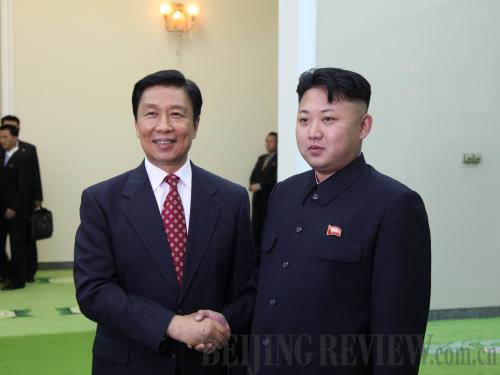|
 |
|
EXCHANGING DIALOGUE: Kim Jong Un (right), top leader of North Korea, meets with visiting Chinese Vice President Li Yuanchao in Pyongyang on July 25 (ZHANG LI) |

Chinese Vice President Li Yuanchao paid a visit to North Korea from July 25 to 28 in commemoration of the 60th anniversary of the Korean War truce. The outside world saw the trip as a move by Beijing to renew relations with Pyongyang. But in fact, Li's trip represents another attempt to promote the denuclearization of the Korean Peninsula, demonstrating China's resolution to maintain regional peace and stability.
Historic juncture
The situation on the Korean Peninsula has seen ups and downs in the first half of 2013. At the beginning of the year, the UN Security Council issued Resolution 2087 to impose sanctions on Pyongyang, claiming that North Korea's satellite launch at the end of 2012 violated Security Council resolutions that forbid Pyongyang from using ballistic missile technology for any launch. Pyongyang then conducted its third nuclear test on February 12 in protest, attempting to safeguard its right to develop space technology.
However, the third nuclear test by North Korea ushered in a new stage of the nuclear dilemma. Pyongyang announced that it has successfully mastered technology for the production of smaller and lighter atomic bombs, posing a nuclear threat to U.S. military bases in Japan and even the U.S. mainland. Hence, the risk of military confrontation between North Korea and the United States escalated.
On March 7, the UN Security Council unanimously passed Resolution 2094, imposing tougher sanctions on Pyongyang as punishment for its third nuclear test. Shortly afterward, Washington announced it would send its new B-52 bomber to join U.S.-South Korean joint military drills. During one such naval drill in May, Washington even sent its nuclear-powered aircraft carrier USS Nimitz, one of the largest warships in the world, to South Korea's eastern coast, where the drills were held. Pyongyang countered with a characteristically threatening statement, announcing the withdrawal of the truce agreement and positioning its missiles for a counterattack. The peninsula was once again on the verge of war.
The third nuclear test of North Korea has in a sense brought the peninsula to a new crossroad. There remains little hope for reconciliation between Seoul and Pyongyang 60 years after the Korean War truce, and an arms race between the two is escalating. Support for the development of nuclear arms is also increasing in South Korea and Japan. Though South Korean President Park Geun Hye called for building trust with North Korea during her trip to the United States, there is no indication that the situation on the peninsula is returning to the right track.
Channel for dialogue
The rapidly changing state of the Korean Peninsula is a problem for all relevant parties. With hostility flaring between Pyongyang and Seoul as well as Washington, putting the nuclear issue on the table for dialogue is an immense challenge. The remnants of a Cold War mindset have been the major obstacle to peace on the peninsula. For the Asia-Pacific region as a whole, the U.S. "pivot to Asia" strategy, which appears to be driven by Cold War thinking, complicates any potential solution.
To break the pattern of confrontation, one of China's diplomatic steps is to establish a new type of relations between major powers with the United States, thus building a Sino-U.S. cooperative framework that minimizes the Cold War factor. On the Korean Peninsula, China has also worked to establish strategic cooperation with South Korea, splitting the Cold War pattern at a deeper level. Meanwhile, maintaining close communication with the top leadership of Pyongyang will allow China to positively influence events on the peninsula.
No matter how we define the Beijing-Pyongyang relationship, it is undeniable that the relationship of the two is of special geopolitical significance. That's not only because Chinese and North Korean people fought side by side to defend their countries more than six decades ago, but also because their geostrategic interests are deeply intertwined. The policies of each side will have a great influence on the geostrategic interests of the other.
| 